Public International Law: Boko Haram's Impact & Somaliland Analysis
VerifiedAdded on 2023/06/15
|11
|3497
|494
Report
AI Summary
This report provides an analysis of Public International Law through two case studies: the actions of Boko Haram and the legal issues surrounding Somaliland. It examines the use of force by Boko Haram in Nigeria, considering the UN Charter's provisions on self-defense and humanitarian intervention. The report also explores the legal implications for Australia regarding the kidnapping of Australian nuns. Furthermore, it analyzes the Somaliland situation, focusing on its international recognition challenges and a contract dispute involving RWP Construction, examining relevant building codes and international commercial law. The analysis considers various articles of the UN charter.
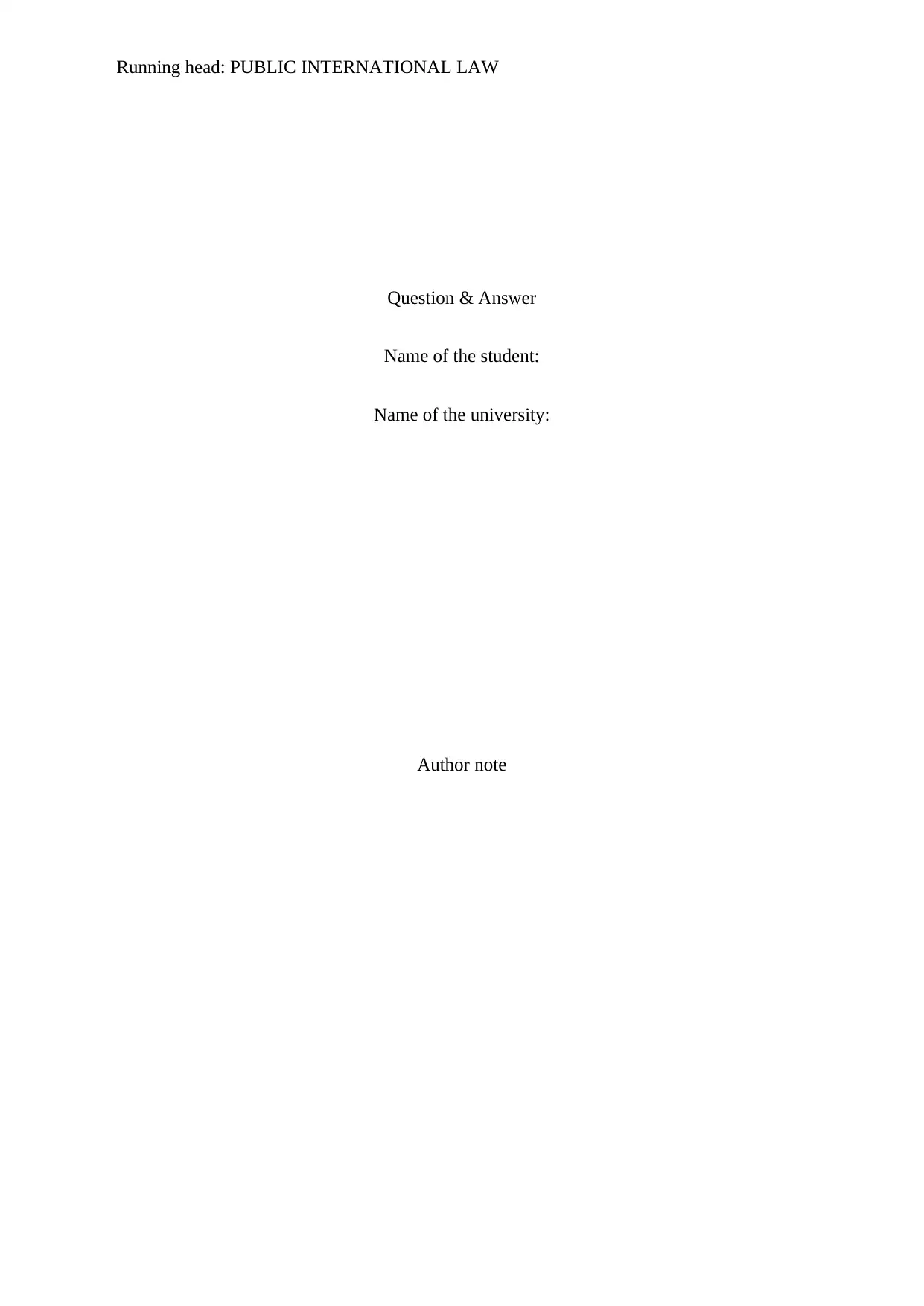
Running head: PUBLIC INTERNATIONAL LAW
Question & Answer
Name of the student:
Name of the university:
Author note
Question & Answer
Name of the student:
Name of the university:
Author note
Paraphrase This Document
Need a fresh take? Get an instant paraphrase of this document with our AI Paraphraser
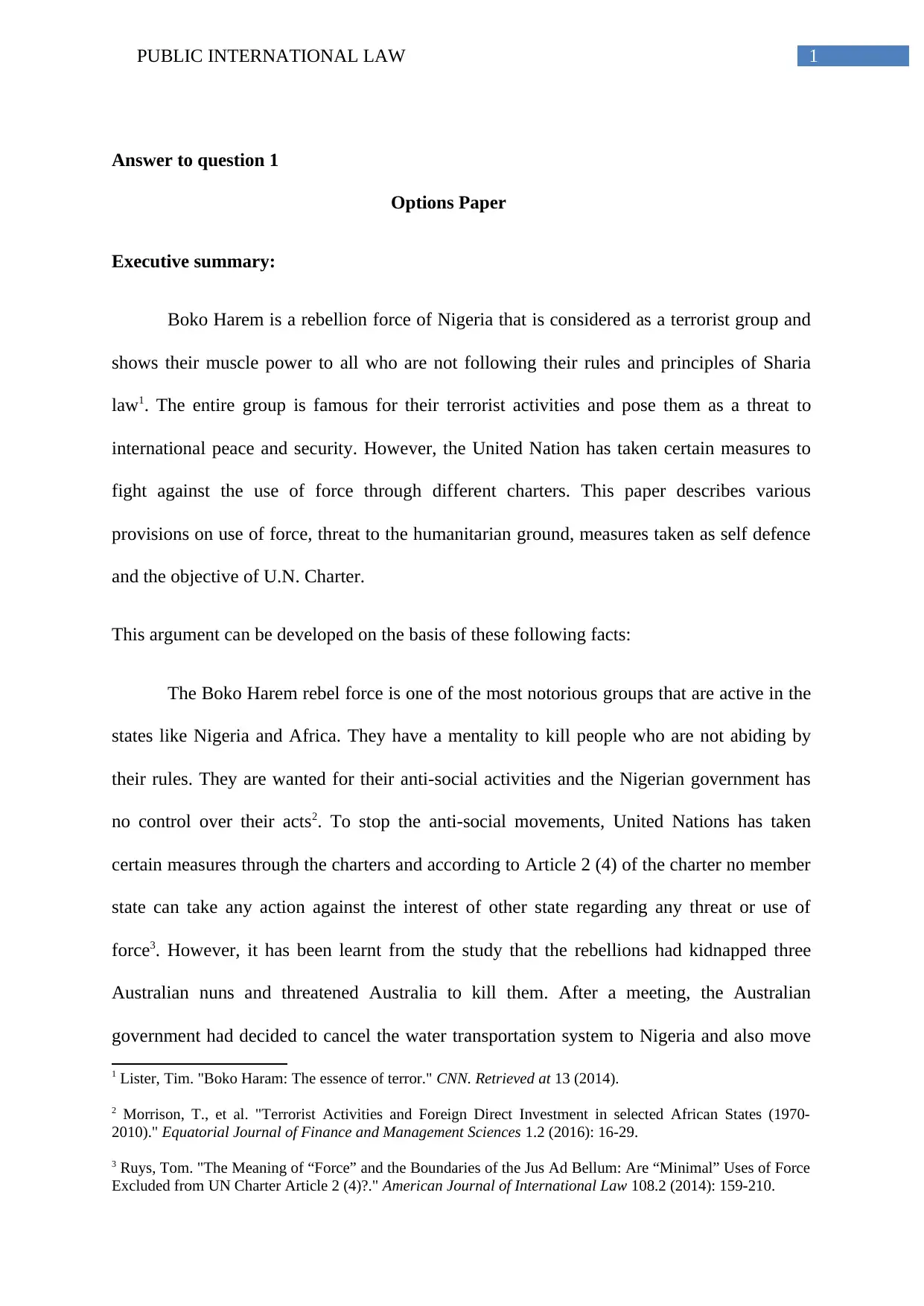
1PUBLIC INTERNATIONAL LAW
Answer to question 1
Options Paper
Executive summary:
Boko Harem is a rebellion force of Nigeria that is considered as a terrorist group and
shows their muscle power to all who are not following their rules and principles of Sharia
law1. The entire group is famous for their terrorist activities and pose them as a threat to
international peace and security. However, the United Nation has taken certain measures to
fight against the use of force through different charters. This paper describes various
provisions on use of force, threat to the humanitarian ground, measures taken as self defence
and the objective of U.N. Charter.
This argument can be developed on the basis of these following facts:
The Boko Harem rebel force is one of the most notorious groups that are active in the
states like Nigeria and Africa. They have a mentality to kill people who are not abiding by
their rules. They are wanted for their anti-social activities and the Nigerian government has
no control over their acts2. To stop the anti-social movements, United Nations has taken
certain measures through the charters and according to Article 2 (4) of the charter no member
state can take any action against the interest of other state regarding any threat or use of
force3. However, it has been learnt from the study that the rebellions had kidnapped three
Australian nuns and threatened Australia to kill them. After a meeting, the Australian
government had decided to cancel the water transportation system to Nigeria and also move
1 Lister, Tim. "Boko Haram: The essence of terror." CNN. Retrieved at 13 (2014).
2 Morrison, T., et al. "Terrorist Activities and Foreign Direct Investment in selected African States (1970-
2010)." Equatorial Journal of Finance and Management Sciences 1.2 (2016): 16-29.
3 Ruys, Tom. "The Meaning of “Force” and the Boundaries of the Jus Ad Bellum: Are “Minimal” Uses of Force
Excluded from UN Charter Article 2 (4)?." American Journal of International Law 108.2 (2014): 159-210.
Answer to question 1
Options Paper
Executive summary:
Boko Harem is a rebellion force of Nigeria that is considered as a terrorist group and
shows their muscle power to all who are not following their rules and principles of Sharia
law1. The entire group is famous for their terrorist activities and pose them as a threat to
international peace and security. However, the United Nation has taken certain measures to
fight against the use of force through different charters. This paper describes various
provisions on use of force, threat to the humanitarian ground, measures taken as self defence
and the objective of U.N. Charter.
This argument can be developed on the basis of these following facts:
The Boko Harem rebel force is one of the most notorious groups that are active in the
states like Nigeria and Africa. They have a mentality to kill people who are not abiding by
their rules. They are wanted for their anti-social activities and the Nigerian government has
no control over their acts2. To stop the anti-social movements, United Nations has taken
certain measures through the charters and according to Article 2 (4) of the charter no member
state can take any action against the interest of other state regarding any threat or use of
force3. However, it has been learnt from the study that the rebellions had kidnapped three
Australian nuns and threatened Australia to kill them. After a meeting, the Australian
government had decided to cancel the water transportation system to Nigeria and also move
1 Lister, Tim. "Boko Haram: The essence of terror." CNN. Retrieved at 13 (2014).
2 Morrison, T., et al. "Terrorist Activities and Foreign Direct Investment in selected African States (1970-
2010)." Equatorial Journal of Finance and Management Sciences 1.2 (2016): 16-29.
3 Ruys, Tom. "The Meaning of “Force” and the Boundaries of the Jus Ad Bellum: Are “Minimal” Uses of Force
Excluded from UN Charter Article 2 (4)?." American Journal of International Law 108.2 (2014): 159-210.
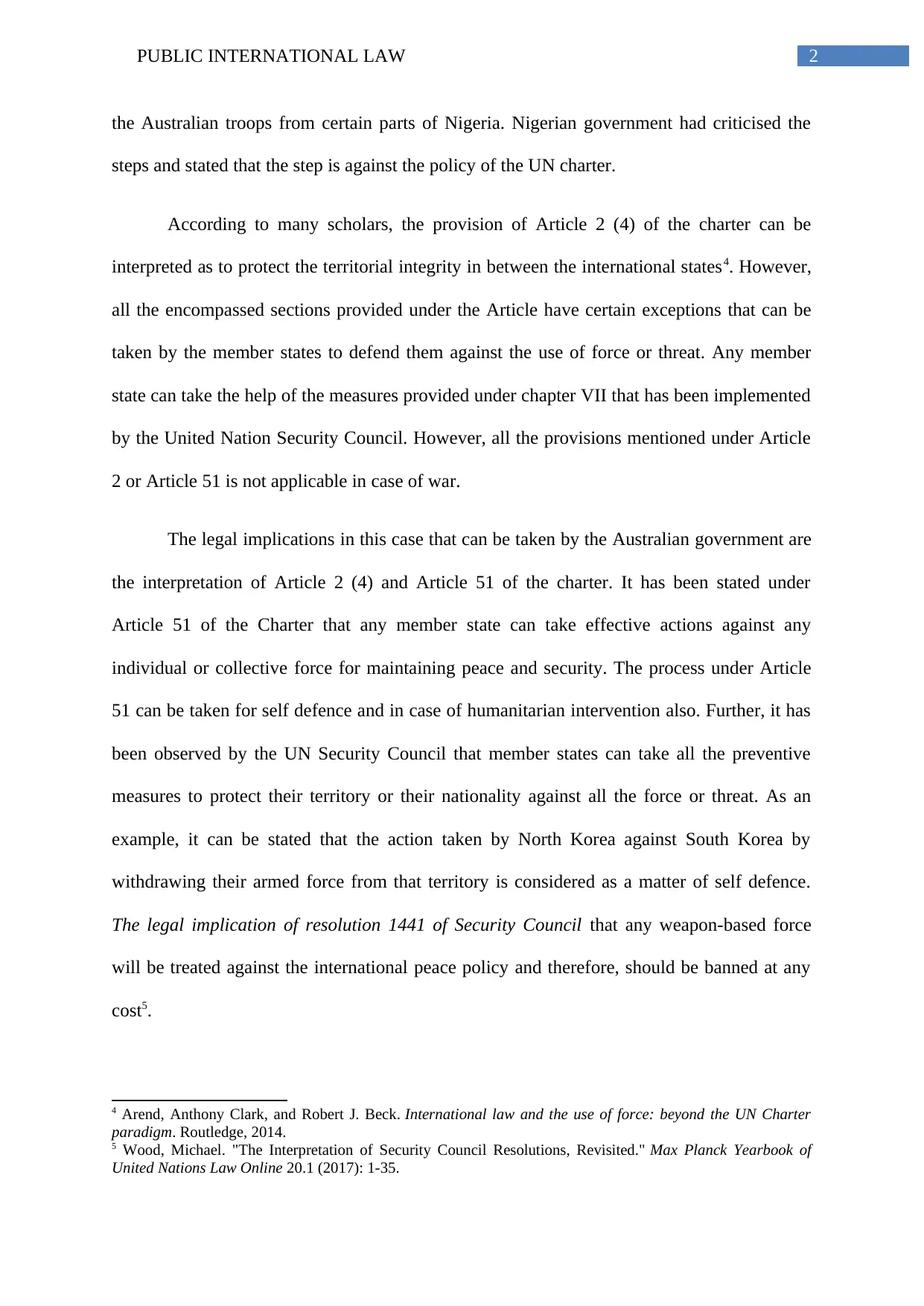
2PUBLIC INTERNATIONAL LAW
the Australian troops from certain parts of Nigeria. Nigerian government had criticised the
steps and stated that the step is against the policy of the UN charter.
According to many scholars, the provision of Article 2 (4) of the charter can be
interpreted as to protect the territorial integrity in between the international states4. However,
all the encompassed sections provided under the Article have certain exceptions that can be
taken by the member states to defend them against the use of force or threat. Any member
state can take the help of the measures provided under chapter VII that has been implemented
by the United Nation Security Council. However, all the provisions mentioned under Article
2 or Article 51 is not applicable in case of war.
The legal implications in this case that can be taken by the Australian government are
the interpretation of Article 2 (4) and Article 51 of the charter. It has been stated under
Article 51 of the Charter that any member state can take effective actions against any
individual or collective force for maintaining peace and security. The process under Article
51 can be taken for self defence and in case of humanitarian intervention also. Further, it has
been observed by the UN Security Council that member states can take all the preventive
measures to protect their territory or their nationality against all the force or threat. As an
example, it can be stated that the action taken by North Korea against South Korea by
withdrawing their armed force from that territory is considered as a matter of self defence.
The legal implication of resolution 1441 of Security Council that any weapon-based force
will be treated against the international peace policy and therefore, should be banned at any
cost5.
4 Arend, Anthony Clark, and Robert J. Beck. International law and the use of force: beyond the UN Charter
paradigm. Routledge, 2014.
5 Wood, Michael. "The Interpretation of Security Council Resolutions, Revisited." Max Planck Yearbook of
United Nations Law Online 20.1 (2017): 1-35.
the Australian troops from certain parts of Nigeria. Nigerian government had criticised the
steps and stated that the step is against the policy of the UN charter.
According to many scholars, the provision of Article 2 (4) of the charter can be
interpreted as to protect the territorial integrity in between the international states4. However,
all the encompassed sections provided under the Article have certain exceptions that can be
taken by the member states to defend them against the use of force or threat. Any member
state can take the help of the measures provided under chapter VII that has been implemented
by the United Nation Security Council. However, all the provisions mentioned under Article
2 or Article 51 is not applicable in case of war.
The legal implications in this case that can be taken by the Australian government are
the interpretation of Article 2 (4) and Article 51 of the charter. It has been stated under
Article 51 of the Charter that any member state can take effective actions against any
individual or collective force for maintaining peace and security. The process under Article
51 can be taken for self defence and in case of humanitarian intervention also. Further, it has
been observed by the UN Security Council that member states can take all the preventive
measures to protect their territory or their nationality against all the force or threat. As an
example, it can be stated that the action taken by North Korea against South Korea by
withdrawing their armed force from that territory is considered as a matter of self defence.
The legal implication of resolution 1441 of Security Council that any weapon-based force
will be treated against the international peace policy and therefore, should be banned at any
cost5.
4 Arend, Anthony Clark, and Robert J. Beck. International law and the use of force: beyond the UN Charter
paradigm. Routledge, 2014.
5 Wood, Michael. "The Interpretation of Security Council Resolutions, Revisited." Max Planck Yearbook of
United Nations Law Online 20.1 (2017): 1-35.
⊘ This is a preview!⊘
Do you want full access?
Subscribe today to unlock all pages.

Trusted by 1+ million students worldwide
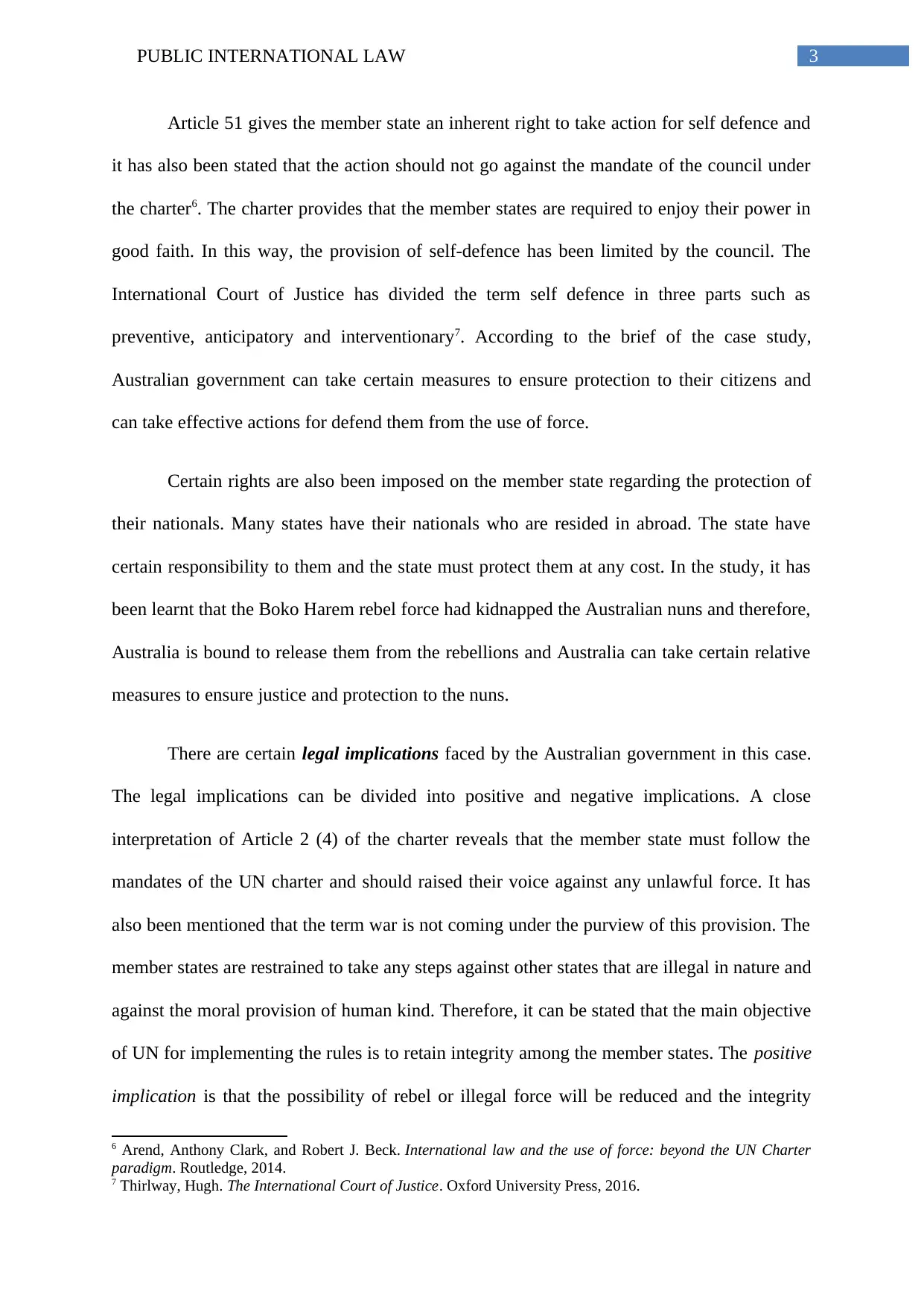
3PUBLIC INTERNATIONAL LAW
Article 51 gives the member state an inherent right to take action for self defence and
it has also been stated that the action should not go against the mandate of the council under
the charter6. The charter provides that the member states are required to enjoy their power in
good faith. In this way, the provision of self-defence has been limited by the council. The
International Court of Justice has divided the term self defence in three parts such as
preventive, anticipatory and interventionary7. According to the brief of the case study,
Australian government can take certain measures to ensure protection to their citizens and
can take effective actions for defend them from the use of force.
Certain rights are also been imposed on the member state regarding the protection of
their nationals. Many states have their nationals who are resided in abroad. The state have
certain responsibility to them and the state must protect them at any cost. In the study, it has
been learnt that the Boko Harem rebel force had kidnapped the Australian nuns and therefore,
Australia is bound to release them from the rebellions and Australia can take certain relative
measures to ensure justice and protection to the nuns.
There are certain legal implications faced by the Australian government in this case.
The legal implications can be divided into positive and negative implications. A close
interpretation of Article 2 (4) of the charter reveals that the member state must follow the
mandates of the UN charter and should raised their voice against any unlawful force. It has
also been mentioned that the term war is not coming under the purview of this provision. The
member states are restrained to take any steps against other states that are illegal in nature and
against the moral provision of human kind. Therefore, it can be stated that the main objective
of UN for implementing the rules is to retain integrity among the member states. The positive
implication is that the possibility of rebel or illegal force will be reduced and the integrity
6 Arend, Anthony Clark, and Robert J. Beck. International law and the use of force: beyond the UN Charter
paradigm. Routledge, 2014.
7 Thirlway, Hugh. The International Court of Justice. Oxford University Press, 2016.
Article 51 gives the member state an inherent right to take action for self defence and
it has also been stated that the action should not go against the mandate of the council under
the charter6. The charter provides that the member states are required to enjoy their power in
good faith. In this way, the provision of self-defence has been limited by the council. The
International Court of Justice has divided the term self defence in three parts such as
preventive, anticipatory and interventionary7. According to the brief of the case study,
Australian government can take certain measures to ensure protection to their citizens and
can take effective actions for defend them from the use of force.
Certain rights are also been imposed on the member state regarding the protection of
their nationals. Many states have their nationals who are resided in abroad. The state have
certain responsibility to them and the state must protect them at any cost. In the study, it has
been learnt that the Boko Harem rebel force had kidnapped the Australian nuns and therefore,
Australia is bound to release them from the rebellions and Australia can take certain relative
measures to ensure justice and protection to the nuns.
There are certain legal implications faced by the Australian government in this case.
The legal implications can be divided into positive and negative implications. A close
interpretation of Article 2 (4) of the charter reveals that the member state must follow the
mandates of the UN charter and should raised their voice against any unlawful force. It has
also been mentioned that the term war is not coming under the purview of this provision. The
member states are restrained to take any steps against other states that are illegal in nature and
against the moral provision of human kind. Therefore, it can be stated that the main objective
of UN for implementing the rules is to retain integrity among the member states. The positive
implication is that the possibility of rebel or illegal force will be reduced and the integrity
6 Arend, Anthony Clark, and Robert J. Beck. International law and the use of force: beyond the UN Charter
paradigm. Routledge, 2014.
7 Thirlway, Hugh. The International Court of Justice. Oxford University Press, 2016.
Paraphrase This Document
Need a fresh take? Get an instant paraphrase of this document with our AI Paraphraser
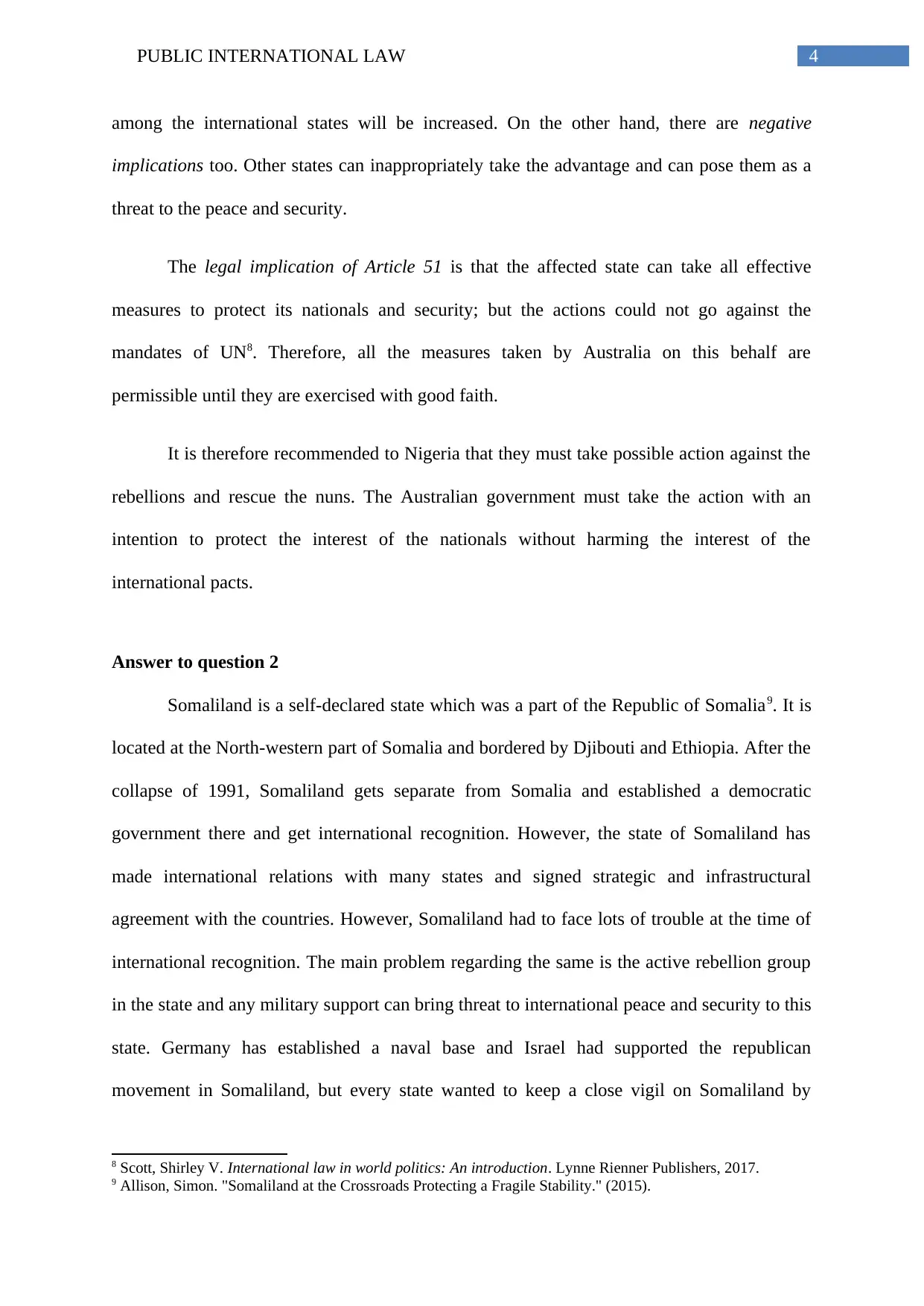
4PUBLIC INTERNATIONAL LAW
among the international states will be increased. On the other hand, there are negative
implications too. Other states can inappropriately take the advantage and can pose them as a
threat to the peace and security.
The legal implication of Article 51 is that the affected state can take all effective
measures to protect its nationals and security; but the actions could not go against the
mandates of UN8. Therefore, all the measures taken by Australia on this behalf are
permissible until they are exercised with good faith.
It is therefore recommended to Nigeria that they must take possible action against the
rebellions and rescue the nuns. The Australian government must take the action with an
intention to protect the interest of the nationals without harming the interest of the
international pacts.
Answer to question 2
Somaliland is a self-declared state which was a part of the Republic of Somalia9. It is
located at the North-western part of Somalia and bordered by Djibouti and Ethiopia. After the
collapse of 1991, Somaliland gets separate from Somalia and established a democratic
government there and get international recognition. However, the state of Somaliland has
made international relations with many states and signed strategic and infrastructural
agreement with the countries. However, Somaliland had to face lots of trouble at the time of
international recognition. The main problem regarding the same is the active rebellion group
in the state and any military support can bring threat to international peace and security to this
state. Germany has established a naval base and Israel had supported the republican
movement in Somaliland, but every state wanted to keep a close vigil on Somaliland by
8 Scott, Shirley V. International law in world politics: An introduction. Lynne Rienner Publishers, 2017.
9 Allison, Simon. "Somaliland at the Crossroads Protecting a Fragile Stability." (2015).
among the international states will be increased. On the other hand, there are negative
implications too. Other states can inappropriately take the advantage and can pose them as a
threat to the peace and security.
The legal implication of Article 51 is that the affected state can take all effective
measures to protect its nationals and security; but the actions could not go against the
mandates of UN8. Therefore, all the measures taken by Australia on this behalf are
permissible until they are exercised with good faith.
It is therefore recommended to Nigeria that they must take possible action against the
rebellions and rescue the nuns. The Australian government must take the action with an
intention to protect the interest of the nationals without harming the interest of the
international pacts.
Answer to question 2
Somaliland is a self-declared state which was a part of the Republic of Somalia9. It is
located at the North-western part of Somalia and bordered by Djibouti and Ethiopia. After the
collapse of 1991, Somaliland gets separate from Somalia and established a democratic
government there and get international recognition. However, the state of Somaliland has
made international relations with many states and signed strategic and infrastructural
agreement with the countries. However, Somaliland had to face lots of trouble at the time of
international recognition. The main problem regarding the same is the active rebellion group
in the state and any military support can bring threat to international peace and security to this
state. Germany has established a naval base and Israel had supported the republican
movement in Somaliland, but every state wanted to keep a close vigil on Somaliland by
8 Scott, Shirley V. International law in world politics: An introduction. Lynne Rienner Publishers, 2017.
9 Allison, Simon. "Somaliland at the Crossroads Protecting a Fragile Stability." (2015).
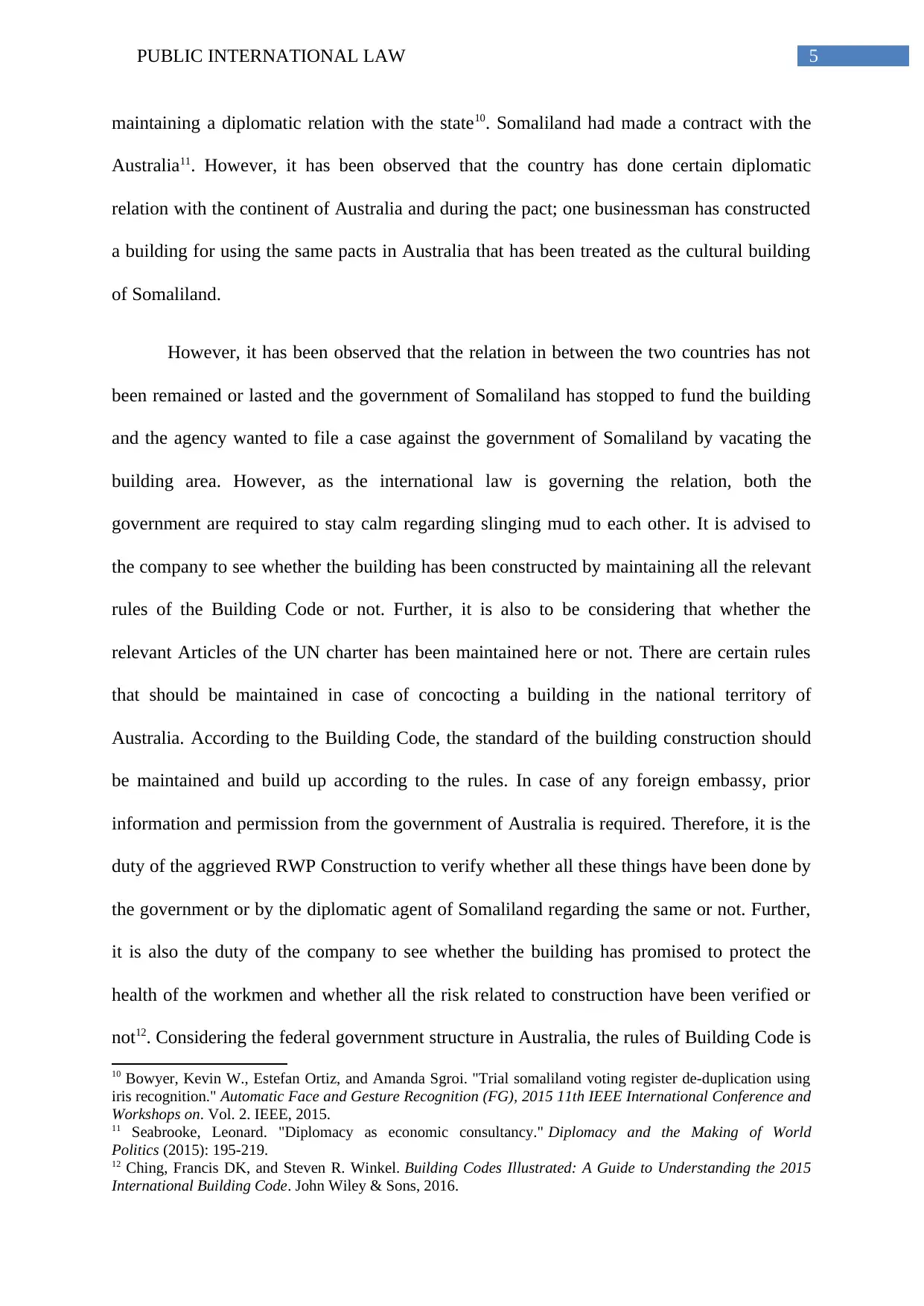
5PUBLIC INTERNATIONAL LAW
maintaining a diplomatic relation with the state10. Somaliland had made a contract with the
Australia11. However, it has been observed that the country has done certain diplomatic
relation with the continent of Australia and during the pact; one businessman has constructed
a building for using the same pacts in Australia that has been treated as the cultural building
of Somaliland.
However, it has been observed that the relation in between the two countries has not
been remained or lasted and the government of Somaliland has stopped to fund the building
and the agency wanted to file a case against the government of Somaliland by vacating the
building area. However, as the international law is governing the relation, both the
government are required to stay calm regarding slinging mud to each other. It is advised to
the company to see whether the building has been constructed by maintaining all the relevant
rules of the Building Code or not. Further, it is also to be considering that whether the
relevant Articles of the UN charter has been maintained here or not. There are certain rules
that should be maintained in case of concocting a building in the national territory of
Australia. According to the Building Code, the standard of the building construction should
be maintained and build up according to the rules. In case of any foreign embassy, prior
information and permission from the government of Australia is required. Therefore, it is the
duty of the aggrieved RWP Construction to verify whether all these things have been done by
the government or by the diplomatic agent of Somaliland regarding the same or not. Further,
it is also the duty of the company to see whether the building has promised to protect the
health of the workmen and whether all the risk related to construction have been verified or
not12. Considering the federal government structure in Australia, the rules of Building Code is
10 Bowyer, Kevin W., Estefan Ortiz, and Amanda Sgroi. "Trial somaliland voting register de-duplication using
iris recognition." Automatic Face and Gesture Recognition (FG), 2015 11th IEEE International Conference and
Workshops on. Vol. 2. IEEE, 2015.
11 Seabrooke, Leonard. "Diplomacy as economic consultancy." Diplomacy and the Making of World
Politics (2015): 195-219.
12 Ching, Francis DK, and Steven R. Winkel. Building Codes Illustrated: A Guide to Understanding the 2015
International Building Code. John Wiley & Sons, 2016.
maintaining a diplomatic relation with the state10. Somaliland had made a contract with the
Australia11. However, it has been observed that the country has done certain diplomatic
relation with the continent of Australia and during the pact; one businessman has constructed
a building for using the same pacts in Australia that has been treated as the cultural building
of Somaliland.
However, it has been observed that the relation in between the two countries has not
been remained or lasted and the government of Somaliland has stopped to fund the building
and the agency wanted to file a case against the government of Somaliland by vacating the
building area. However, as the international law is governing the relation, both the
government are required to stay calm regarding slinging mud to each other. It is advised to
the company to see whether the building has been constructed by maintaining all the relevant
rules of the Building Code or not. Further, it is also to be considering that whether the
relevant Articles of the UN charter has been maintained here or not. There are certain rules
that should be maintained in case of concocting a building in the national territory of
Australia. According to the Building Code, the standard of the building construction should
be maintained and build up according to the rules. In case of any foreign embassy, prior
information and permission from the government of Australia is required. Therefore, it is the
duty of the aggrieved RWP Construction to verify whether all these things have been done by
the government or by the diplomatic agent of Somaliland regarding the same or not. Further,
it is also the duty of the company to see whether the building has promised to protect the
health of the workmen and whether all the risk related to construction have been verified or
not12. Considering the federal government structure in Australia, the rules of Building Code is
10 Bowyer, Kevin W., Estefan Ortiz, and Amanda Sgroi. "Trial somaliland voting register de-duplication using
iris recognition." Automatic Face and Gesture Recognition (FG), 2015 11th IEEE International Conference and
Workshops on. Vol. 2. IEEE, 2015.
11 Seabrooke, Leonard. "Diplomacy as economic consultancy." Diplomacy and the Making of World
Politics (2015): 195-219.
12 Ching, Francis DK, and Steven R. Winkel. Building Codes Illustrated: A Guide to Understanding the 2015
International Building Code. John Wiley & Sons, 2016.
⊘ This is a preview!⊘
Do you want full access?
Subscribe today to unlock all pages.

Trusted by 1+ million students worldwide
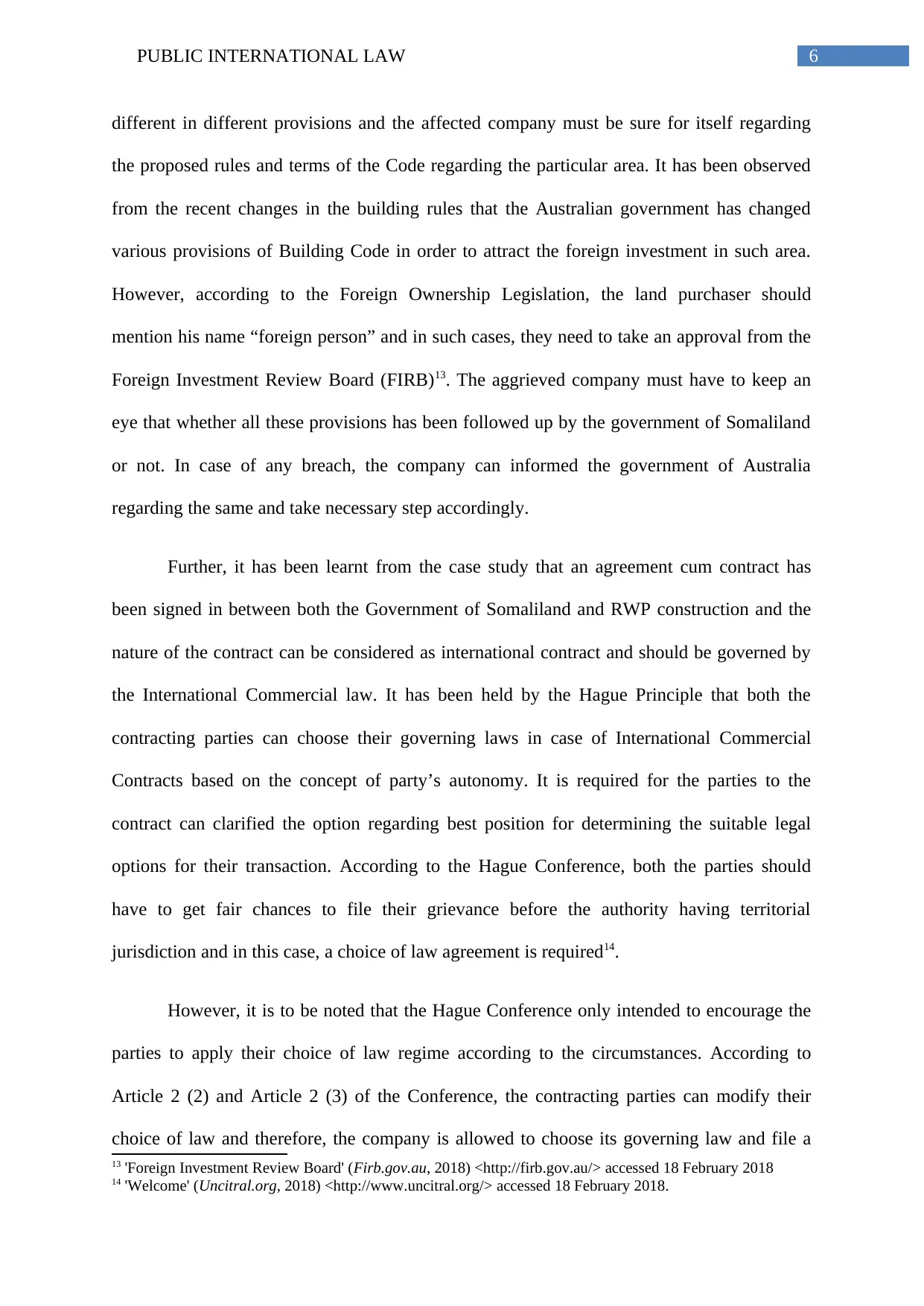
6PUBLIC INTERNATIONAL LAW
different in different provisions and the affected company must be sure for itself regarding
the proposed rules and terms of the Code regarding the particular area. It has been observed
from the recent changes in the building rules that the Australian government has changed
various provisions of Building Code in order to attract the foreign investment in such area.
However, according to the Foreign Ownership Legislation, the land purchaser should
mention his name “foreign person” and in such cases, they need to take an approval from the
Foreign Investment Review Board (FIRB)13. The aggrieved company must have to keep an
eye that whether all these provisions has been followed up by the government of Somaliland
or not. In case of any breach, the company can informed the government of Australia
regarding the same and take necessary step accordingly.
Further, it has been learnt from the case study that an agreement cum contract has
been signed in between both the Government of Somaliland and RWP construction and the
nature of the contract can be considered as international contract and should be governed by
the International Commercial law. It has been held by the Hague Principle that both the
contracting parties can choose their governing laws in case of International Commercial
Contracts based on the concept of party’s autonomy. It is required for the parties to the
contract can clarified the option regarding best position for determining the suitable legal
options for their transaction. According to the Hague Conference, both the parties should
have to get fair chances to file their grievance before the authority having territorial
jurisdiction and in this case, a choice of law agreement is required14.
However, it is to be noted that the Hague Conference only intended to encourage the
parties to apply their choice of law regime according to the circumstances. According to
Article 2 (2) and Article 2 (3) of the Conference, the contracting parties can modify their
choice of law and therefore, the company is allowed to choose its governing law and file a
13 'Foreign Investment Review Board' (Firb.gov.au, 2018) <http://firb.gov.au/> accessed 18 February 2018
14 'Welcome' (Uncitral.org, 2018) <http://www.uncitral.org/> accessed 18 February 2018.
different in different provisions and the affected company must be sure for itself regarding
the proposed rules and terms of the Code regarding the particular area. It has been observed
from the recent changes in the building rules that the Australian government has changed
various provisions of Building Code in order to attract the foreign investment in such area.
However, according to the Foreign Ownership Legislation, the land purchaser should
mention his name “foreign person” and in such cases, they need to take an approval from the
Foreign Investment Review Board (FIRB)13. The aggrieved company must have to keep an
eye that whether all these provisions has been followed up by the government of Somaliland
or not. In case of any breach, the company can informed the government of Australia
regarding the same and take necessary step accordingly.
Further, it has been learnt from the case study that an agreement cum contract has
been signed in between both the Government of Somaliland and RWP construction and the
nature of the contract can be considered as international contract and should be governed by
the International Commercial law. It has been held by the Hague Principle that both the
contracting parties can choose their governing laws in case of International Commercial
Contracts based on the concept of party’s autonomy. It is required for the parties to the
contract can clarified the option regarding best position for determining the suitable legal
options for their transaction. According to the Hague Conference, both the parties should
have to get fair chances to file their grievance before the authority having territorial
jurisdiction and in this case, a choice of law agreement is required14.
However, it is to be noted that the Hague Conference only intended to encourage the
parties to apply their choice of law regime according to the circumstances. According to
Article 2 (2) and Article 2 (3) of the Conference, the contracting parties can modify their
choice of law and therefore, the company is allowed to choose its governing law and file a
13 'Foreign Investment Review Board' (Firb.gov.au, 2018) <http://firb.gov.au/> accessed 18 February 2018
14 'Welcome' (Uncitral.org, 2018) <http://www.uncitral.org/> accessed 18 February 2018.
Paraphrase This Document
Need a fresh take? Get an instant paraphrase of this document with our AI Paraphraser
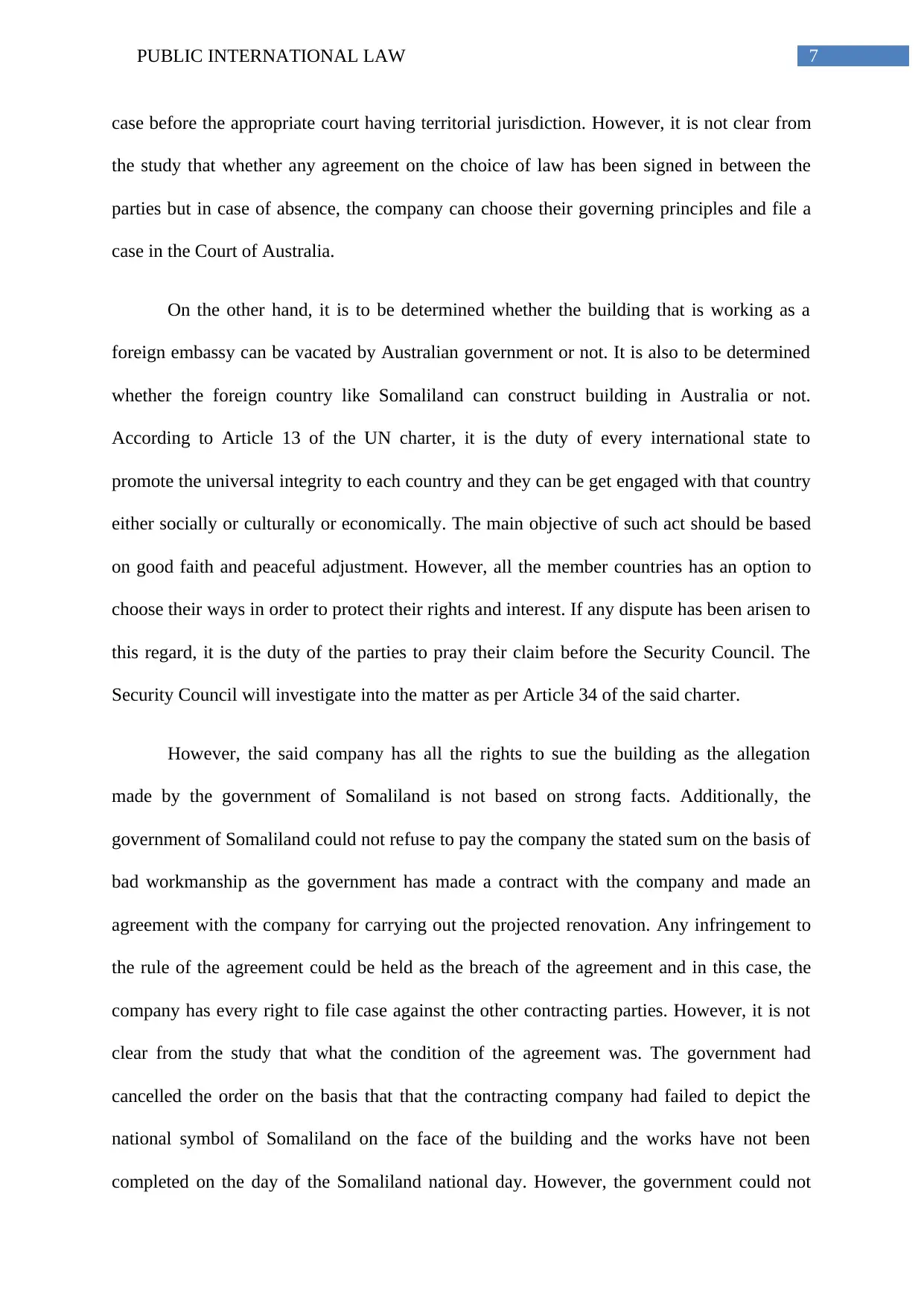
7PUBLIC INTERNATIONAL LAW
case before the appropriate court having territorial jurisdiction. However, it is not clear from
the study that whether any agreement on the choice of law has been signed in between the
parties but in case of absence, the company can choose their governing principles and file a
case in the Court of Australia.
On the other hand, it is to be determined whether the building that is working as a
foreign embassy can be vacated by Australian government or not. It is also to be determined
whether the foreign country like Somaliland can construct building in Australia or not.
According to Article 13 of the UN charter, it is the duty of every international state to
promote the universal integrity to each country and they can be get engaged with that country
either socially or culturally or economically. The main objective of such act should be based
on good faith and peaceful adjustment. However, all the member countries has an option to
choose their ways in order to protect their rights and interest. If any dispute has been arisen to
this regard, it is the duty of the parties to pray their claim before the Security Council. The
Security Council will investigate into the matter as per Article 34 of the said charter.
However, the said company has all the rights to sue the building as the allegation
made by the government of Somaliland is not based on strong facts. Additionally, the
government of Somaliland could not refuse to pay the company the stated sum on the basis of
bad workmanship as the government has made a contract with the company and made an
agreement with the company for carrying out the projected renovation. Any infringement to
the rule of the agreement could be held as the breach of the agreement and in this case, the
company has every right to file case against the other contracting parties. However, it is not
clear from the study that what the condition of the agreement was. The government had
cancelled the order on the basis that that the contracting company had failed to depict the
national symbol of Somaliland on the face of the building and the works have not been
completed on the day of the Somaliland national day. However, the government could not
case before the appropriate court having territorial jurisdiction. However, it is not clear from
the study that whether any agreement on the choice of law has been signed in between the
parties but in case of absence, the company can choose their governing principles and file a
case in the Court of Australia.
On the other hand, it is to be determined whether the building that is working as a
foreign embassy can be vacated by Australian government or not. It is also to be determined
whether the foreign country like Somaliland can construct building in Australia or not.
According to Article 13 of the UN charter, it is the duty of every international state to
promote the universal integrity to each country and they can be get engaged with that country
either socially or culturally or economically. The main objective of such act should be based
on good faith and peaceful adjustment. However, all the member countries has an option to
choose their ways in order to protect their rights and interest. If any dispute has been arisen to
this regard, it is the duty of the parties to pray their claim before the Security Council. The
Security Council will investigate into the matter as per Article 34 of the said charter.
However, the said company has all the rights to sue the building as the allegation
made by the government of Somaliland is not based on strong facts. Additionally, the
government of Somaliland could not refuse to pay the company the stated sum on the basis of
bad workmanship as the government has made a contract with the company and made an
agreement with the company for carrying out the projected renovation. Any infringement to
the rule of the agreement could be held as the breach of the agreement and in this case, the
company has every right to file case against the other contracting parties. However, it is not
clear from the study that what the condition of the agreement was. The government had
cancelled the order on the basis that that the contracting company had failed to depict the
national symbol of Somaliland on the face of the building and the works have not been
completed on the day of the Somaliland national day. However, the government could not
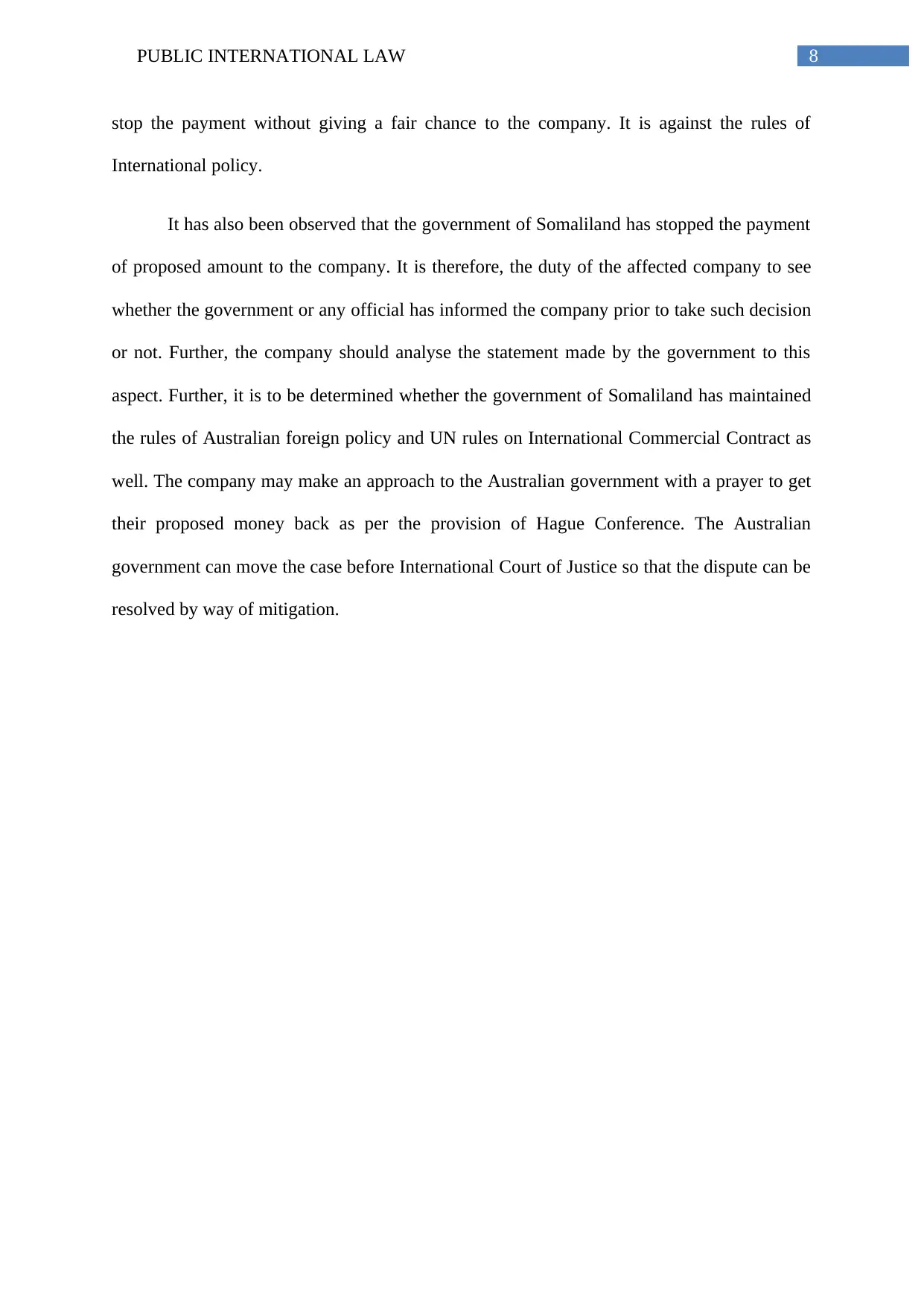
8PUBLIC INTERNATIONAL LAW
stop the payment without giving a fair chance to the company. It is against the rules of
International policy.
It has also been observed that the government of Somaliland has stopped the payment
of proposed amount to the company. It is therefore, the duty of the affected company to see
whether the government or any official has informed the company prior to take such decision
or not. Further, the company should analyse the statement made by the government to this
aspect. Further, it is to be determined whether the government of Somaliland has maintained
the rules of Australian foreign policy and UN rules on International Commercial Contract as
well. The company may make an approach to the Australian government with a prayer to get
their proposed money back as per the provision of Hague Conference. The Australian
government can move the case before International Court of Justice so that the dispute can be
resolved by way of mitigation.
stop the payment without giving a fair chance to the company. It is against the rules of
International policy.
It has also been observed that the government of Somaliland has stopped the payment
of proposed amount to the company. It is therefore, the duty of the affected company to see
whether the government or any official has informed the company prior to take such decision
or not. Further, the company should analyse the statement made by the government to this
aspect. Further, it is to be determined whether the government of Somaliland has maintained
the rules of Australian foreign policy and UN rules on International Commercial Contract as
well. The company may make an approach to the Australian government with a prayer to get
their proposed money back as per the provision of Hague Conference. The Australian
government can move the case before International Court of Justice so that the dispute can be
resolved by way of mitigation.
⊘ This is a preview!⊘
Do you want full access?
Subscribe today to unlock all pages.

Trusted by 1+ million students worldwide
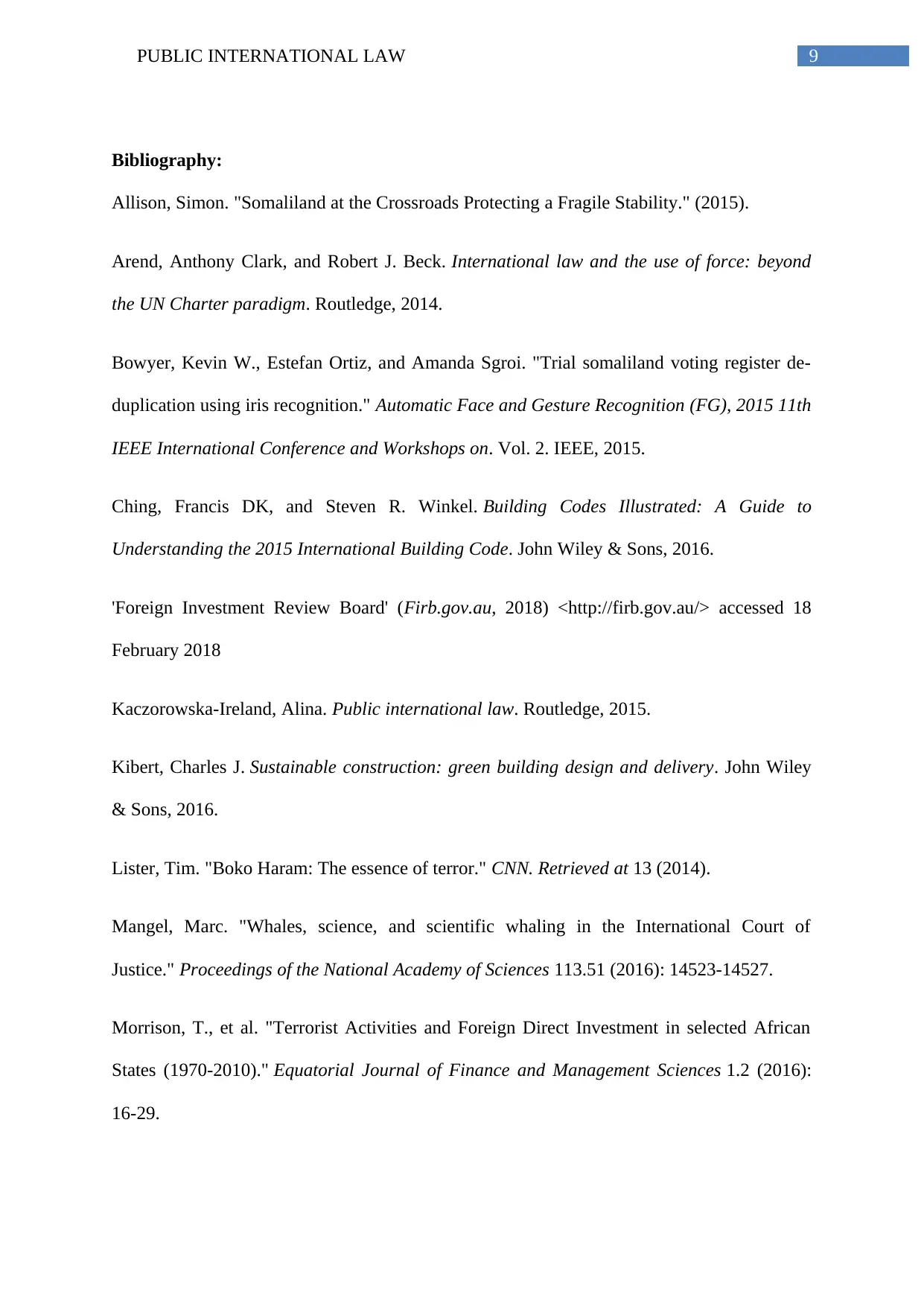
9PUBLIC INTERNATIONAL LAW
Bibliography:
Allison, Simon. "Somaliland at the Crossroads Protecting a Fragile Stability." (2015).
Arend, Anthony Clark, and Robert J. Beck. International law and the use of force: beyond
the UN Charter paradigm. Routledge, 2014.
Bowyer, Kevin W., Estefan Ortiz, and Amanda Sgroi. "Trial somaliland voting register de-
duplication using iris recognition." Automatic Face and Gesture Recognition (FG), 2015 11th
IEEE International Conference and Workshops on. Vol. 2. IEEE, 2015.
Ching, Francis DK, and Steven R. Winkel. Building Codes Illustrated: A Guide to
Understanding the 2015 International Building Code. John Wiley & Sons, 2016.
'Foreign Investment Review Board' (Firb.gov.au, 2018) <http://firb.gov.au/> accessed 18
February 2018
Kaczorowska-Ireland, Alina. Public international law. Routledge, 2015.
Kibert, Charles J. Sustainable construction: green building design and delivery. John Wiley
& Sons, 2016.
Lister, Tim. "Boko Haram: The essence of terror." CNN. Retrieved at 13 (2014).
Mangel, Marc. "Whales, science, and scientific whaling in the International Court of
Justice." Proceedings of the National Academy of Sciences 113.51 (2016): 14523-14527.
Morrison, T., et al. "Terrorist Activities and Foreign Direct Investment in selected African
States (1970-2010)." Equatorial Journal of Finance and Management Sciences 1.2 (2016):
16-29.
Bibliography:
Allison, Simon. "Somaliland at the Crossroads Protecting a Fragile Stability." (2015).
Arend, Anthony Clark, and Robert J. Beck. International law and the use of force: beyond
the UN Charter paradigm. Routledge, 2014.
Bowyer, Kevin W., Estefan Ortiz, and Amanda Sgroi. "Trial somaliland voting register de-
duplication using iris recognition." Automatic Face and Gesture Recognition (FG), 2015 11th
IEEE International Conference and Workshops on. Vol. 2. IEEE, 2015.
Ching, Francis DK, and Steven R. Winkel. Building Codes Illustrated: A Guide to
Understanding the 2015 International Building Code. John Wiley & Sons, 2016.
'Foreign Investment Review Board' (Firb.gov.au, 2018) <http://firb.gov.au/> accessed 18
February 2018
Kaczorowska-Ireland, Alina. Public international law. Routledge, 2015.
Kibert, Charles J. Sustainable construction: green building design and delivery. John Wiley
& Sons, 2016.
Lister, Tim. "Boko Haram: The essence of terror." CNN. Retrieved at 13 (2014).
Mangel, Marc. "Whales, science, and scientific whaling in the International Court of
Justice." Proceedings of the National Academy of Sciences 113.51 (2016): 14523-14527.
Morrison, T., et al. "Terrorist Activities and Foreign Direct Investment in selected African
States (1970-2010)." Equatorial Journal of Finance and Management Sciences 1.2 (2016):
16-29.
Paraphrase This Document
Need a fresh take? Get an instant paraphrase of this document with our AI Paraphraser
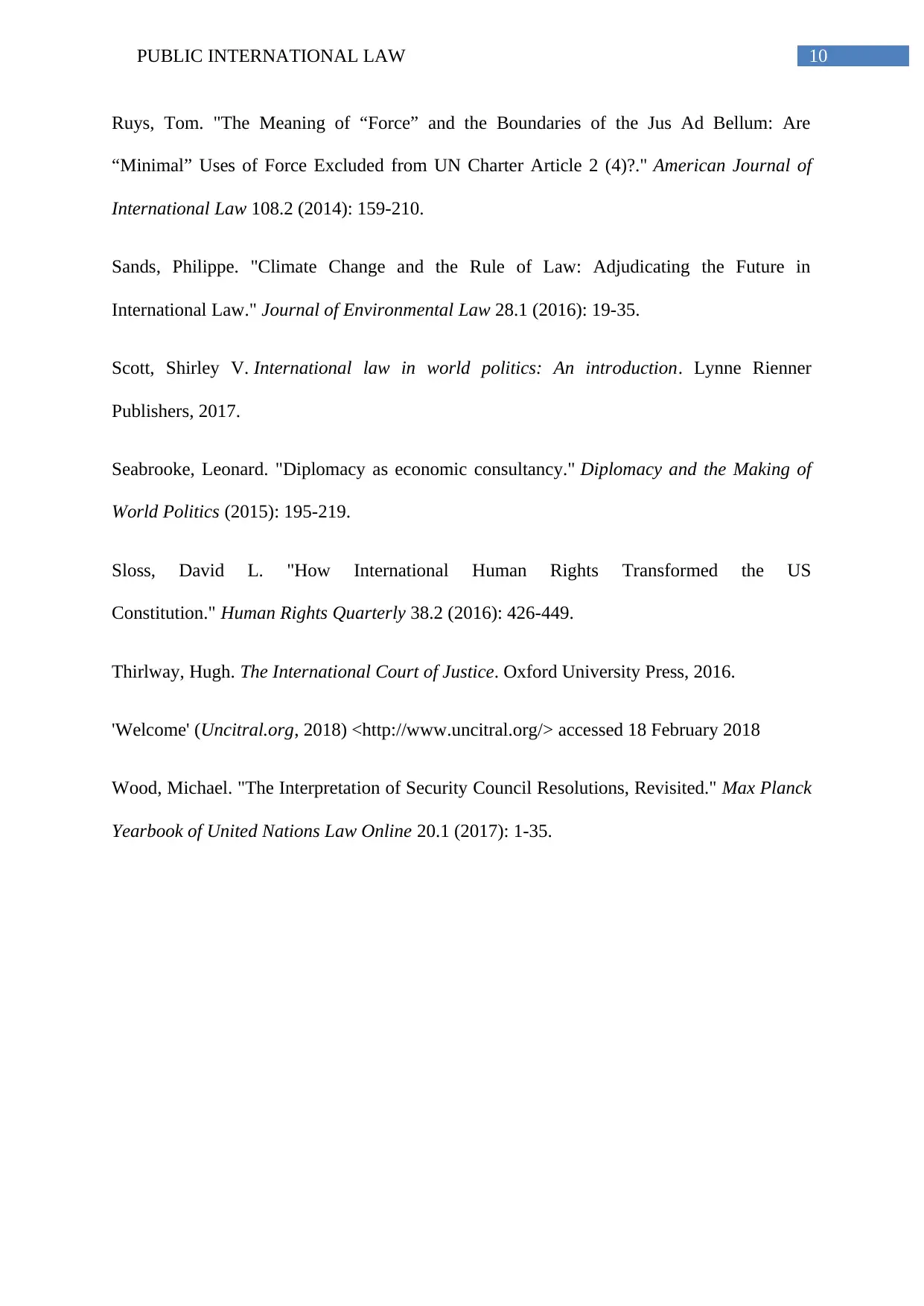
10PUBLIC INTERNATIONAL LAW
Ruys, Tom. "The Meaning of “Force” and the Boundaries of the Jus Ad Bellum: Are
“Minimal” Uses of Force Excluded from UN Charter Article 2 (4)?." American Journal of
International Law 108.2 (2014): 159-210.
Sands, Philippe. "Climate Change and the Rule of Law: Adjudicating the Future in
International Law." Journal of Environmental Law 28.1 (2016): 19-35.
Scott, Shirley V. International law in world politics: An introduction. Lynne Rienner
Publishers, 2017.
Seabrooke, Leonard. "Diplomacy as economic consultancy." Diplomacy and the Making of
World Politics (2015): 195-219.
Sloss, David L. "How International Human Rights Transformed the US
Constitution." Human Rights Quarterly 38.2 (2016): 426-449.
Thirlway, Hugh. The International Court of Justice. Oxford University Press, 2016.
'Welcome' (Uncitral.org, 2018) <http://www.uncitral.org/> accessed 18 February 2018
Wood, Michael. "The Interpretation of Security Council Resolutions, Revisited." Max Planck
Yearbook of United Nations Law Online 20.1 (2017): 1-35.
Ruys, Tom. "The Meaning of “Force” and the Boundaries of the Jus Ad Bellum: Are
“Minimal” Uses of Force Excluded from UN Charter Article 2 (4)?." American Journal of
International Law 108.2 (2014): 159-210.
Sands, Philippe. "Climate Change and the Rule of Law: Adjudicating the Future in
International Law." Journal of Environmental Law 28.1 (2016): 19-35.
Scott, Shirley V. International law in world politics: An introduction. Lynne Rienner
Publishers, 2017.
Seabrooke, Leonard. "Diplomacy as economic consultancy." Diplomacy and the Making of
World Politics (2015): 195-219.
Sloss, David L. "How International Human Rights Transformed the US
Constitution." Human Rights Quarterly 38.2 (2016): 426-449.
Thirlway, Hugh. The International Court of Justice. Oxford University Press, 2016.
'Welcome' (Uncitral.org, 2018) <http://www.uncitral.org/> accessed 18 February 2018
Wood, Michael. "The Interpretation of Security Council Resolutions, Revisited." Max Planck
Yearbook of United Nations Law Online 20.1 (2017): 1-35.
1 out of 11
Related Documents
Your All-in-One AI-Powered Toolkit for Academic Success.
+13062052269
info@desklib.com
Available 24*7 on WhatsApp / Email
![[object Object]](/_next/static/media/star-bottom.7253800d.svg)
Unlock your academic potential
Copyright © 2020–2026 A2Z Services. All Rights Reserved. Developed and managed by ZUCOL.




